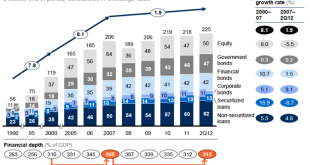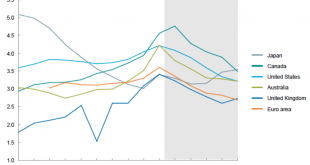The claim that our current healthcare and pension policies are unsustainable is a classic zombie idea on the political right, embodied in the regular Interngerational Reports produced by the Australian Treasury which invariably fail to mention the real threat to the future posed by climate change and environmental destruction more generally. In the US, the release of the trustees reports for Social Security and Medicare has produced <a...
Read More »Brian Romanchuk — Understanding Why Governments Cannot Use Stock Prices As A Policy Tool
Professor Roger E. Farmer proposed in his book Prosperity for All (link to my review) that governments should set up a body to control equity prices as a means to smooth the economic cycle. In this article, I explain why a government could not hope to control the level of stock prices in a meaningful sense.... Bond Economics Understanding Why Governments Cannot Use Stock Prices As A Policy ToolBrian Romanchuk
Read More »Banks, Capital Markets, and Institutional Investors as Providers of Long-Term Finance
This is the second in a series of blog posts on financing infrastructure assets. From 1990 to 2012, the stock of global financial assets increased from $56 trillion to $225 trillion. In 2012, it included a $50 trillion stock market, $47 trillion public debt securities market, $42 trillion in financial institution bonds outstanding, $11 trillion in non-financial corporate bonds, and $62 trillion in non-securitized loans and $13 trillion in securitized loans outstanding (Figure 1). Figure...
Read More »Bill Mitchell — Timor – challenges for the new government — Part 1-3 of 3
This is Part 3 (and final) of my mini-series analysing some of the challenges that the newly elected majority government in Timor-Leste faces. In Part 2, I discussed the progress of the Strategic Development Plan and the challenges ahead in terms of poverty, unemployment, and other indicators relating to the development process. In Part 2, I focused more on the currency debate – documenting how the IMF and World Bank had infused its ideological stance into the currency arrangements that...
Read More »L-A-W
I’ve stopped doing instant reactions on Budgets. There’s always plenty available now, at places like Inside Story, as well as in the newspapers. But there’s often something of interest that gets overlooked a bit. In this case, it’s the government’s proposal to legislate tax cuts for the rich seven years in advance. This is an idea with a lengthy and inglorious history, taken to a new extreme. As far as I know, the first government to legislate future tax cuts was that of Paul Keating,...
Read More »L-A-W
I’ve stopped doing instant reactions on Budgets. There’s always plenty available now, at places like Inside Story, as well as in the newspapers. But there’s often something of interest that gets overlooked a bit. In this case, it’s the government’s proposal to legislate tax cuts for the rich seven years in advance. This is an idea with a lengthy and inglorious history, taken to a new extreme. As far as I know, the first government to legislate future tax cuts was that of Paul Keating,...
Read More »Dean Baker — More Thoughts on a Job Guarantee: What Is At Issue?
Let's be clear. What is really at issue is whether a buffer stock of employed is sociao-economically superior to a buffer stock of unemployed Efficiency A buffer stock of employed is far more efficient in that it employs available resources that would otherwise be idle (wasted). In addition, the funds that go toward supporting the out of work ignore the productive capacity of the unemployed. As the right is so find of pointing out, this incentivized unemployment. Effectiveness A...
Read More »Lars P. Syll — Busting the NAIRU myth
Making policy based on fairy tales.Lars P. Syll’s BlogBusting the NAIRU mythLars P. Syll | Professor, Malmo University
Read More »On the Costs of Doing Without a Job Guarantee
Michael Stephens | May 1, 2018 Pavlina Tcherneva — who, along with L. Randall Wray, Flavia Dantas, Scott Fullwiler, and Stephanie Kelton, authored this report estimating the economic impact of a job guarantee proposal (the Public Service Employment program) — was interviewed by Bloomberg’s Joe Weisenthal and Julia Chatterley about the purposes and costs of the plan. This recently released policy note by L. Randall Wray also...
Read More »The Massive Need for Infrastructure in the Emerging and Developed World
This is the first in a series of blog posts on financing infrastructure assets Insufficient or inadequate infrastructure in both developing and developed economies has sparked a debate about whether financing is sufficient to sustain infrastructure investment to at least keep pace with projected global GDP growth. The task of keeping the minimum investment required to maintain current levels and fostering incremental spending to close the infrastructure gap has revived the debate over...
Read More » Heterodox
Heterodox


